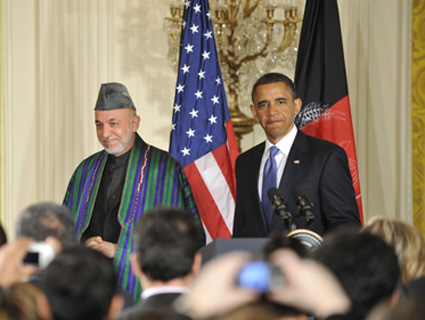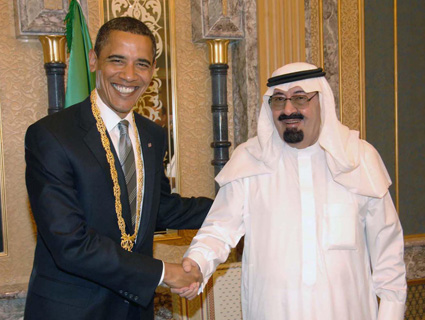
Presiden Barack Obama and visiting Afghan President Hamid Karzai attend a joint press conference.Xinhua/ZUMA
![]() This story first appeared on the TomDispatch website.
This story first appeared on the TomDispatch website.
In the method, there is madness; in the comedy, nightmare; in the tragedy, farce.
And despite everything, there’s still good news when it comes to what Americans can accomplish in the face of the impossible! No, not a debt-ceiling deal in Washington. So much better than that.
According to Thom Shanker of the New York Times, the US military has gathered biometric data—”digital scans of eyes, photographs of the face, and fingerprints”—on 2.2 million Iraqis and 1.5 million Afghans, with an emphasis on men of an age to become insurgents, and has saved all of it in the Automated Biometric Information System, a vast computerized database. Imagine: we’re talking about one of every 14 Iraqis and one of every 20 Afghans. Who says America’s a can’t-do nation?
The Pentagon is pouring an estimated $3.5 billion into its biometric programs (2007 through 2015). And though it’s been a couple of rough weeks when it comes to money in Washington, at least no one can claim that taxpayer dollars have been ill-spent on this project. Give the Pentagon just another five to 10 years in Iraq and Afghanistan and the biometric endeavor of a lifetime should be complete. Then Washington will be able to identify any Iraqi or Afghan on the planet by eye-scan alone.
Be proud, America!
And consider that feat a bright spot of American accomplishment (and not the only one either) in a couple of weeks of can’t-do news from the Greater Middle East. After all, despite those biometric scans, an assassin managed to gun down Our Man in Kandahar (OMK), Ahmed Wali Karzai, the Afghan president’s half-brother, in his own residence. He was the warlord the US military buddied up with as US troops were surging south in 2009 and who helped bring American-style “progress” to the Taliban heartland.
Of course, before he was OMK and our great ally in southern Afghanistan, he was OEK (Our Enemy in Kandahar), the down-and-dirty, election-fixing, drug-running evil dude whom one American military official more or less threatened to take out. (“The only way to clean up Chicago is to get rid of Capone” was the way that Major General Michael Flynn, the top US military intelligence officer in the country, put it at the time.) And before he was OEK, he was CMK (the CIA’s Man in Kandahar), right up there on the Agency’s payroll; and even before that, speaking of Chicago, he was a restaurateur in that city who… but I’m losing track of my point, as Americans have a knack for doing in Afghanistan.
Anyway, as I think I was saying, OMK-OEK-CMK was assassinated by Sardar Mohammad, a man he trusted and saw six days a week, a local “police commander” who, according to the Washington Post’s Joshua Partlow, “spent years as an ally of the United States in the war against the Taliban.” He was also reputedly a “trusted CIA contact” who had worked closely with US Special Forces. He had, so associates believe, either been turned by the Taliban in the last few months or was a long-time sleeper agent.
And then when security couldn’t have been tighter, at a service in a Kandahar mosque where hundreds (including top government officials from the region) had gathered to pay their respects to the dead capo, a suicide bomber wearing a turban-bomb somehow slipped inside and blew himself up, killing among others the chief of the Kandahar Province religious council.
In other words, even though the US military tried to flood the zone in southern Afghanistan, its claims of progress and improved security are already giving way to a nowhere-to-hide Taliban world. These events could certainly be considered the insurgency’s symbolic goodbye to General David Petraeus, the US surge commander there, who was just handing over command and readying himself to return to Washington to become CIA director. In a further sign of deteriorating security, an advisor to Afghan President Hamid Karzai was assassinated (along with a member of parliament) in heavily guarded Kabul when a squad of Taliban gunmen stormed his walled compound.
To look on the bright side, though, that turban bomb may prove useful indeed to the Homeland Security lobby and the Transportation Security Administration back in the US After all, it’s one more thing to strip off in airports along with the usual assortment of wallets, belts, baseball caps, and footwear; and it’s a surefire Homeland Security Department fear-stoker, hence fundraiser, to add to suppository bombs and possibly mythical but well-publicized surgically implanted bombs. (And bad news for any Sikhs with air travel in mind.)
Franchising a No-Friends Policy
Biometrics aside, there were some other startling numbers out of the Greater Middle East recently. As it happened, some non-military types were also looking into eyes, not for retinal patterns, but patterns of thought. Pollsters from IBOPE Zogby International checked out 4,000 sets of eyes in six Middle Eastern countries—Egypt, Lebanon, Jordan, Saudi Arabia, the United Arab Emirates, and Morocco—at least five of which qualify as US allies, and in none of which has the US bombed, invaded, or carried out a night raid in recent memory.
And still, favorable opinion about the United States had plunged dismally since the early, heady days of the Obama presidency. In many cases, the numbers are now below those registered in the last year of the Bush era (and you can imagine what they were). Only 5% of post-Arab-Spring Egyptians, for instance, claimed to have a “favorable view” of the United States, and across the six countries, only 10% of respondents “described themselves as having a favorable view of Obama.”
 This spring, Pew pollsters found similarly plunging favorability ratings in the Greater Middle East. More recently, they asked Pakistanis about the CIA drone strikes in that country’s tribal borderlands and came up with a polling near-impossibility: 97% of Pakistanis looked upon them negatively!
This spring, Pew pollsters found similarly plunging favorability ratings in the Greater Middle East. More recently, they asked Pakistanis about the CIA drone strikes in that country’s tribal borderlands and came up with a polling near-impossibility: 97% of Pakistanis looked upon them negatively!
Consider that another remarkable American accomplishment of the Obama era—creating such unity of opinion in an otherwise fractious land!
Once upon a time, of course, American accomplishments involved the building of vast highway systems or massive steel mills or even the winning of a World War, but in tougher times you take your accomplishments where you find them. And these polls emphasize one thing: that what Washington continues to do in the Greater Middle East with relentless brilliance and on an almost unimaginable scale is to make no friends.
Nor is it just in popularity terms that Washington has been racking up mind-boggling numbers in the no-friends business. In a study it just released, the “Costs of War” project at Brown University found that Washington’s wars in Iraq and Afghanistan will, in the end, eat $3.2 trillion to $4 trillion in taxpayer money—and that’s without adding in the air war in Libya (perhaps a chump-change billion dollars), the Global War on Terror (in places like Yemen and Somalia where, as Jeremy Scahill reports in the Nation magazine, the CIA is running quite a covert operation from a walled compound in the confines of Mogadishu’s international airport), our continuing frenzy of base building and ally supporting in the Persian Gulf area, military aid to the region, and so on.
In other words, not making friends in the Greater Middle East turns out to be a spectacularly budget-busting undertaking—and so an accomplishment in its own right. And rest assured, Washington isn’t likely to settle for 10% or 5% on those favorability figures either, not when absolute perfection in unpopularity is within reach. Just in the last weeks, in a clear effort to lower those numbers, Washington has launched air attacks in Somalia (at least two wounded), Yemen (50 dead), Pakistan (at least 48 dead), Libya (no count), and Afghanistan (at least 40, including children). Despite what Washington officials imagine, drones are, in practice, neither precise nor effective weapons. But they are radicalizing instruments in an American war that, again in practice, is not just on but for terror.
In the same period, ex-CIA director and now Secretary of Defense Leon Panetta landed in Iraq and promptly launched a volley of threats at the Iranians, Shiite militias in Iraq, and the Iraqi government. Meanwhile, just to make sure Washington doesn’t lose its unique unpopularity franchise in the Israeli-Palestinian conflict, the State Department issued a “stern warning” to and threatened prosecution of those Americans who boarded boats in the blockade-busting Gaza flotilla, almost none of which ever made it out of Greek harbors.
If those favorability numbers haven’t gone lower in the brief period since the Zogby pollsters finished their latest round of polling, one thing can be said: it wasn’t for lack of trying.
A Modern Gordian Knot
Nor should we leave the subject of no-friends franchises without making special mention of the remarkable American one in Pakistan. Not so long ago, an elite SEAL team set off “SEAL-mania” in the US by launching a strike on Osama bin Laden’s hideout-in-plain-sight in Abbottabad, Pakistan, killing the al-Qaeda leader without a warning to the Pakistani government or military. The response there seems to have been a new round of America-phobia—thus undoubtedly fulfilling bin Laden’s fondest dream: that even in death he would sink Washington deeper into the quagmire of the Greater Middle East.)
A farcical ballet followed between the Pakistani military, its intelligence services, its civilian government and the Obama administration. The Pakistanis promptly ordered 120 US special operations forces training the paramilitary Frontier Corps in those tribal areas out of the country. It refused to issue visas for US “equipment technicians” and arrested five men who had aided the CIA in tracking down bin Laden. Washington responded with the usual “stern warnings,” accused the Pakistanis of tipping off al-Qaeda bomb-makers in those borderlands before they could be caught, and held back equipment meant for the Frontier Corps. Congress began to balk on the Pakistani aid package.
The Pakistanis, in turn, threatened to halt CIA drone flights from the biggest of the three airbases the Agency borrows in that country. The Obama administration responded that, with or without those bases, its air campaign would go on, and then sent in the drones repeatedly to hammer the point home. It also held back $800 million in military aid—not enough to truly matter, but just enough to further tick off the Pakistanis. Defense Minister Chaudhry Ahmad Mukhtar jabbed back by threatening to withdraw his country’s troops from the Afghan border areas. “We cannot afford to keep our military out in the mountains for such a long period of time,” he said in a TV interview. Meanwhile, envoys ferried back and forth with the usual grab bag of threats, bribes, pleas, and meaningless statements of unity between allies. And so it went.
Think of the Washington-Islamabad relationship, wrapped in the disaster of the Afghan War, as a classic can’t-live-with-’em-or-without-’em marriage made in hell. Or, if you prefer, think of it, now so many decades and two Afghan wars old, as a kind of Gordian knot.
In 333 BC, with a single swift stroke of his sword, Alexander the Great famously solved the problem of a knot on an ox cart in Gordium (in modern Turkey) that no one could untie. He sliced it open, so the story goes, in what has always been considered an ingenious response to an otherwise insoluble problem.
America’s Gordian knot in Pakistan, as in Afghanistan and the Greater Middle East, is beyond untying. Hold back that $800 million, send in the drones, cajole, plead, threaten, issue stern warnings, train, equip, bribe, kill. None of it does the trick. None of it will. Alexander would have known what to do. Washington is clueless.
Thought about a certain way, this might be the ultimate American accomplishment of the present moment.
Tom Engelhardt, co-founder of the American Empire Project and the author of The End of Victory Culture, runs the Nation Institute’s TomDispatch.com. His latest book is The American Way of War: How Bush’s Wars Became Obama’s (Haymarket Books). To stay on top of important articles like these, sign up to receive the latest updates from TomDispatch.com here.
















